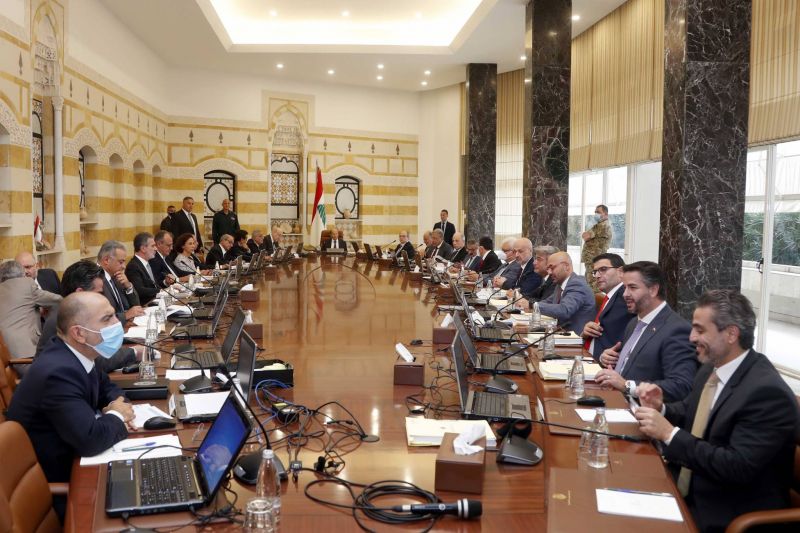
The outcomes of the cabinet’s first meeting on Wednesday included naming a team that will lead a fresh round of bailout negotiations with the IMF. (Credit: Dalati & Nohra)
Want to get the Morning Brief by email? Click here to sign up.
Najib Mikati’s government made a spate of decisions at its first substantive cabinet meeting, including naming a team that will lead a fresh round of financial bailout negotiations. The renewed talks with the International Monetary Fund will be led by Deputy Premier Saade Chami, Finance Minister Youssef Khalil, Economy Minister Amin Salam, Banque du Liban Gov. Riad Salameh and two advisers to President Michel Aoun, Charbel Kordahi and Rafik Haddad. The cabinet also decided to borrow $100 million from BDL to buy fuel, with Energy Minister Walid Fayad claiming that the additional fuel, in addition to fuel being procured through a deal by the previous government with Iraq, will enable the state to provide up to eight hours of electricity a day. The ministers also transferred the investigation into the Tleil, Akkar, fuel tanker explosion to the Court of Justice, which is also responsible for the Beirut port explosion investigation.
Banque du Liban extended the LL3,900 withdrawal rate for so-called lollars stuck in banks until Jan. 31, 2022. The rate was set to expire today. The central bank said it put off setting a new rate yesterday because changing the withdrawal rate in the absence of a comprehensive reform plan would have “significant repercussions” on money supply and the currency exchange rate. Ibrahim Kanaan, who chairs Parliament’s Finance and Budget Committee, told L’Orient Today he will ask the Finance Ministry to invoke its authority to veto BDL circulars to pressure the central bank to set a new rate. Meanwhile, the Association of Depositors in Lebanon called for sit-ins and occupations of banks and BDL branches starting today.
Hundreds of people, including families of those killed in the Beirut port explosion, protested the suspension of the investigation into the devastating incident yesterday. Brief scuffles between protesters and security forces took place at a rally in front of Beirut’s Justice Palace, but no injuries or arrests were reported. Members of the crowd chanted “Hezbollah are terrorists,” which appeared to divide the victims’ families, with some leaving the protest in response. Judge Tarek Bitar, the lead investigator in the port case, was reportedly threatened by Hezbollah security chief Wafic Safa last week. Bitar’s investigation has been stalled since Monday as a result of legal challenges by high-ranking politicians subject to the probe.
Fuel prices rose slightly yesterday, with 20 liters of 95-octane gasoline reaching LL206,400. Twenty liters of 98-octane gas now cost LL213,500, and the price of the same amount of diesel rose by more than LL20,000 to become LL183,600. This is the third price increase in just two weeks as the government prepares to fully end fuel subsidies that have been in place for two years as of today. A ration card for Lebanon’s most vulnerable is supposed to blunt the impact of the subsidy’s removal, but its implementation has been delayed. Parliament’s National Economy, Trade, Industry and Planning Committee will meet today at 11 a.m. to follow up on the ration card and “work to overcome obstacles.” In its meeting yesterday, cabinet did not touch on the subject.
The Jordanian premier will meet with Lebanon’s “three presidents” today as part of a Jordanian ministerial delegation to Lebanon. His first meeting will be with Prime Minister Najib Mikati, followed by meetings with President Michel Aoun and Parliament Speaker Nabih Berri. The visit’s agenda includes discussing energy cooperation and an American proposal that would see Egyptian natural gas delivered to Lebanon via Jordan and Syria, according to Jordan’s government news agency. Such plans have been under discussion for years, but gained new prominence amid Lebanon’s electricity crisis when US Ambassador Dorothy Shea indicated Washington’s willingness to work around its own sanctions against Damascus. Shea’s proposal was seen as a response to the import of Iranian fuel, which Hezbollah leader Hassan Nasrallah announced the same day.